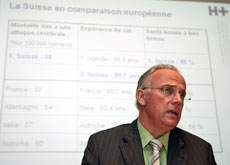Hospitals pledge to step up quality control

The Swiss Hospital Association, H+, is to launch a quality label in an effort to improve the standards of hospitals and clinics.
Thursday’s announcement comes two days after a survey concluded that the larger the hospital, the greater the probability that a patient would contract an infection.
The aim of the quality label is to provide transparency and comparability in hospitals across the country, according to H+ president Charles Favre, who added that the quality of Swiss hospitals was already high but should be higher.
An OECD/WHO report in 2006 showed that Switzerland has the lowest death rate in Europe for patients who have had a stroke.
In addition Swiss women have the third-longest life expectancy – after those in Japan and Spain – and men the fourth-highest – after those from Iceland, Japan and Sweden.
But Favre said more could still be done to step up prevention, which he said was the responsibility of the Federal Health Office and which was given less attention in Switzerland than abroad.
The rate of breast cancer diagnosis for example was significantly lower than the OECD average, he said.
More data
Dominique Sprumont, a professor of health law at Neuchâtel University, told swissinfo that the idea of a quality label was not new but its realisation had been triggered by the Comparis study on Tuesday.
“It is a natural conclusion of a long process during which Swiss hospitals have realised that they also need to pay attention to the quality of the care and the quality of the services they provide – not only the medical care but also the food and accommodation and so on,” he said.
H+ said it aimed to bring out by 2010 a handbook of Swiss hospitals listing 15 quality indicators of each one.
But Sprumont said that “before transparency we need adequate data”.
“This is true not only for Switzerland but for most countries,” he said. “We lack the tools to analyse the quality of care and the relationship between the cost and the efficacy of the care provided.”
Bias
Favre described as “important” the survey by Comparis, which found that 11 per cent of patients in university hospital said they had picked up an infection whereas only seven per cent did in smaller hospitals. But he pointed out that the survey was based on the subjective reports of patients.
Sprumont says this is an often-overlooked fact. “What surprised me [regarding the Comparis survey] was the reaction in the media: everyone took it for granted. I saw only one or two articles that were more critical. When you use only subjective information, a patient’s point of view, you have a bias – and it’s a huge bias!”
“The Comparis study for me looks more like a PR move to encourage those people in Switzerland with insurance – that is everyone – to change insurance or request more coverage from private insurers.”
Sprumont added that the Comparis figures reflected only part of the reality.
“That’s why H+ and others pointed out that of course there’s a higher risk of getting an infectious disease at a large hospital because most people who go to those hospitals suffer from more severe conditions”.
Sprumont gave the example of the University Hospital in Geneva, which has one of the highest levels of antibiotic resistance in Switzerland but also the most efficient system to fight antibiotic resistance.
“The fact is that in Geneva due to its large international population there has always been a high prevalence of imported antibiotic resistant bacteria,” he said.
swissinfo, Thomas Stephens
Hospital costs 2005 (comparison 2001):
Total costs: SFr17.2 billion (+18.3%)
Cases: 1.4 million (unchanged)
Average stay: 11.7 days (-7.6%)
Staff: 125,703 full-time jobs (+7.9%)
109,400 people lived in homes for old people, disabled and addicts (+5,000)

In compliance with the JTI standards
More: SWI swissinfo.ch certified by the Journalism Trust Initiative












You can find an overview of ongoing debates with our journalists here . Please join us!
If you want to start a conversation about a topic raised in this article or want to report factual errors, email us at english@swissinfo.ch.